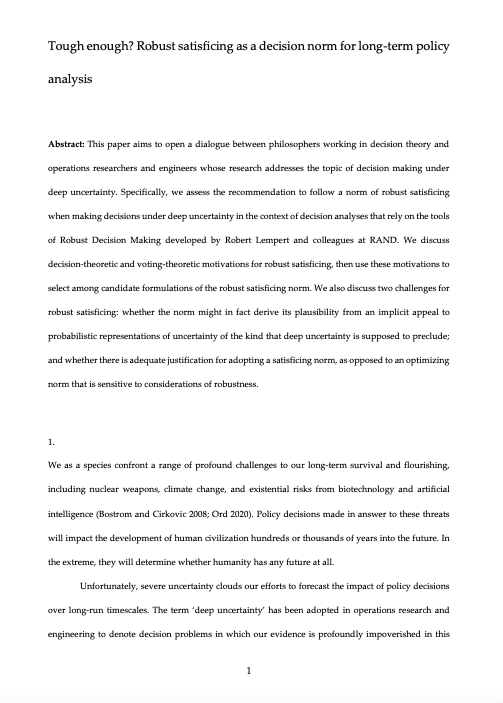Tough enough? Robust satisficing as a decision norm for long-term policy analysis
Andreas Mogensen and David Thorstad (Global Priorities Institute, Oxford University)
GPI Working Paper No. 15-2020, published in Synthese
This paper aims to open a dialogue between philosophers working in decision theory and operations researchers and engineers whose research addresses the topic of decision making under deep uncertainty. Specifically, we assess the recommendation to follow a norm of robust satisficing when making decisions under deep uncertainty in the context of decision analyses that rely on the tools of Robust Decision Making developed by Robert Lempert and colleagues at RAND. We discuss decision-theoretic and voting-theoretic motivations for robust satisficing, then use these motivations to select among candidate formulations of the robust satisficing norm. We also discuss two challenges for robust satisficing: whether the norm might in fact derive its plausibility from an implicit appeal to probabilistic representations of uncertainty of the kind that deep uncertainty is supposed to preclude; and whether there is adequate justification for adopting a satisficing norm, as opposed to an optimizing norm that is sensitive to considerations of robustness.
Other working papers
Existential Risk and Growth – Philip Trammell (Global Priorities Institute and Department of Economics, University of Oxford) and Leopold Aschenbrenner
Technologies may pose existential risks to civilization. Though accelerating technological development may increase the risk of anthropogenic existential catastrophe per period in the short run, two considerations suggest that a sector-neutral acceleration decreases the risk that such a catastrophe ever occurs. First, acceleration decreases the time spent at each technology level. Second, since a richer society is willing to sacrifice more for safety, optimal policy can yield an “existential risk Kuznets curve”; acceleration…
The Hinge of History Hypothesis: Reply to MacAskill – Andreas Mogensen (Global Priorities Institute, University of Oxford)
Some believe that the current era is uniquely important with respect to how well the rest of human history goes. Following Parfit, call this the Hinge of History Hypothesis. Recently, MacAskill has argued that our era is actually very unlikely to be especially influential in the way asserted by the Hinge of History Hypothesis. I respond to MacAskill, pointing to important unresolved ambiguities in his proposed definition of what it means for a time to be influential and criticizing the two arguments…
On two arguments for Fanaticism – Jeffrey Sanford Russell (University of Southern California)
Should we make significant sacrifices to ever-so-slightly lower the chance of extremely bad outcomes, or to ever-so-slightly raise the chance of extremely good outcomes? Fanaticism says yes: for every bad outcome, there is a tiny chance of of extreme disaster that is even worse, and for every good outcome, there is a tiny chance of an enormous good that is even better.

